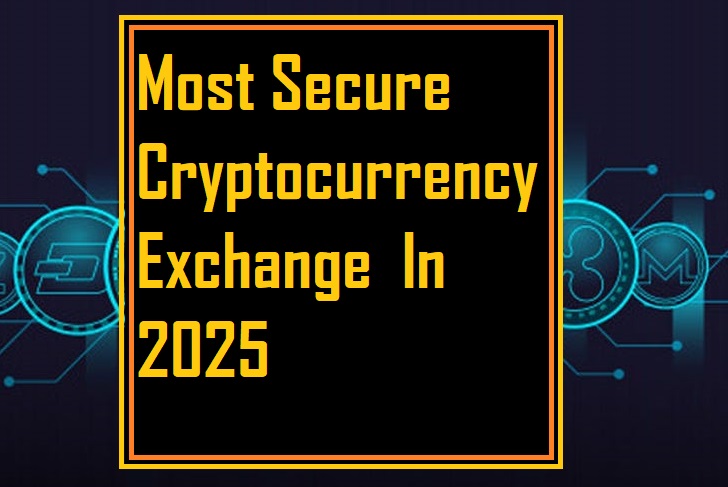As cryptocurrency continues to gain popularity, security has become one of the most important factors when choosing an exchange. With the rise of hacking attacks, phishing schemes, and fraud in the digital space, ensuring the safety of your digital assets is critical.
In this article, we will explore the most secure cryptocurrency exchanges in 2025, focusing on the security measures they implement to protect users’ funds and personal data.
What is a Secure Cryptocurrency Exchange?
A secure cryptocurrency exchange is a platform that prioritizes the safety of its users by implementing strong security protocols to prevent unauthorized access to accounts, secure trading transactions, and protect assets from hacking attacks. These security features include encryption, cold storage wallets, two-factor authentication (2FA), insurance policies, and regular audits.
When evaluating a secure cryptocurrency exchange, it’s essential to consider the following key security features:
- Two-Factor Authentication (2FA): Adds an extra layer of protection by requiring a second verification step (like a code from a mobile app) when logging in or making a transaction.
- Cold Storage: A method of storing cryptocurrency offline to protect it from online hacks. Most reputable exchanges store a large portion of their assets in cold storage.
- Insurance: Some exchanges offer insurance coverage for user funds in case of a security breach or hack.
- Advanced Encryption: Encryption ensures that user data, such as passwords and transaction details, is securely transmitted over the internet.
- Regular Security Audits: Audits ensure that the exchange’s systems are thoroughly checked for vulnerabilities, helping maintain a secure environment.
Let’s dive into the most secure cryptocurrency exchanges available today in 2025.
1. Binance: Top-Level Security Features
Binance is one of the largest and most popular cryptocurrency exchanges globally, offering a robust platform for trading digital assets. Binance has continually improved its security measures over the years, making it one of the most secure platforms for crypto traders.
- Security Features:
- Two-Factor Authentication (2FA): Binance requires users to enable 2FA for account access, adding an extra layer of protection.
- Cold Storage: The majority of Binance’s assets are stored in cold storage, ensuring that user funds are not vulnerable to online attacks.
- Secure Asset Fund for Users (SAFU): Binance created SAFU, an emergency insurance fund that compensates users in the event of a security breach.
- Advanced Encryption: Binance uses advanced encryption protocols to protect user data and transactions.
Pros:
- Robust security measures
- Cold storage and insurance fund
- Regular security updates
Cons:
- Can be overwhelming for beginners
- Limited fiat support in some countries
2. Coinbase: Industry-Leading Security for U.S. Users
Coinbase is one of the most widely recognized cryptocurrency exchanges, especially in the United States. With a user-friendly interface and a strong focus on security, Coinbase is ideal for both beginners and experienced traders.
- Security Features:
- Cold Storage: Coinbase stores 98% of its digital assets in cold storage, offering an additional layer of protection for user funds.
- Two-Factor Authentication (2FA): Coinbase requires 2FA for user accounts, preventing unauthorized access.
- Insurance: Coinbase offers insurance for digital assets held in its hot wallets, ensuring user funds are protected against hacks.
- Regular Audits: Coinbase undergoes regular security audits to ensure the integrity of its systems.
Pros:
- Easy-to-use interface
- Industry-leading security measures
- Insurance for hot wallets
Cons:
- Higher fees than other exchanges
- Limited support for advanced trading features
3. Kraken: Secure and Regulated Platform
Kraken is one of the oldest and most trusted cryptocurrency exchanges in the world. Known for its advanced features and high security standards, Kraken has earned a reputation for providing a safe trading environment for crypto investors.
- Security Features:
- Two-Factor Authentication (2FA): Kraken offers 2FA for all accounts, ensuring that users’ funds are protected.
- Cold Storage: Kraken stores most user funds in cold storage, reducing the risk of hacks.
- Security Audits: Kraken’s security is frequently audited to maintain compliance with industry standards.
- Advanced Encryption: Kraken uses high-end encryption to protect users’ personal and financial data.
Pros:
- Highly secure and regulated
- Advanced trading features for experienced traders
- Cold storage for the majority of assets
Cons:
- Not the most beginner-friendly platform
- Fees can be high for low-volume traders
4. Gemini: Regulated and Insured Platform
Gemini is a regulated cryptocurrency exchange based in the United States. It is known for its compliance with regulatory standards and its strong security features, making it one of the safest exchanges for both retail and institutional investors.
- Security Features:
- Two-Factor Authentication (2FA): Gemini requires 2FA to secure user accounts and prevent unauthorized access.
- Cold Storage: The majority of Gemini’s funds are stored in cold storage, offering a high level of protection against hacks.
- Insurance: Gemini provides insurance coverage for digital assets held in its hot wallets, giving users peace of mind in case of a breach.
- Advanced Encryption: Gemini uses SSL encryption to secure user data and transactions.
Pros:
- Fully regulated and insured
- Strong security measures
- Suitable for both retail and institutional investors
Cons:
- Higher fees compared to other exchanges
- Limited cryptocurrency options compared to competitors
5. Bitstamp: Reliable and Secure for European Users
Bitstamp is a European-based exchange that offers high-security features for cryptocurrency trading. Known for its reliability and transparency, Bitstamp provides a safe environment for buying, selling, and trading digital assets.
- Security Features:
- Two-Factor Authentication (2FA): Bitstamp requires 2FA to enhance account security.
- Cold Storage: Bitstamp stores most of its assets in cold storage to protect user funds from online threats.
- Advanced Encryption: Bitstamp employs SSL encryption for secure data transmission.
- Security Audits: The platform is regularly audited to ensure compliance with industry security standards.
Pros:
- Trusted platform with high security
- Cold storage for user funds
- Regular security audits
Cons:
- Limited selection of cryptocurrencies
- Not as feature-rich as other exchanges
Key Security Features to Look for in a Cryptocurrency Exchange
When selecting a cryptocurrency exchange for secure trading, look for platforms that offer the following security features:
- Two-Factor Authentication (2FA): Always enable 2FA to add an extra layer of security to your account.
- Cold Storage: Ensure that the platform stores a large portion of its funds in cold storage to protect them from hacks.
- Insurance: Look for exchanges that offer insurance for digital assets stored in hot wallets.
- Encryption: Choose exchanges that use SSL encryption to protect your data during transactions.
- Regular Security Audits: Regular audits ensure that the platform maintains robust security measures and complies with industry standards.
As cryptocurrency trading continues to evolve, security remains a top priority for investors. Binance, Coinbase, Kraken, Gemini, and Bitstamp are among the most secure cryptocurrency exchanges available in 2025, offering advanced security features like cold storage, two-factor authentication, insurance, and regular audits.
By choosing a secure exchange, you can protect your digital assets from hacks and fraud, ensuring a safe trading experience.










